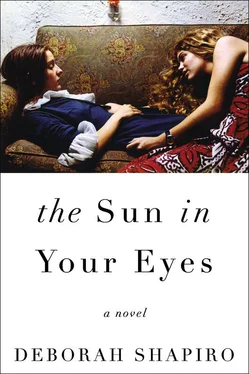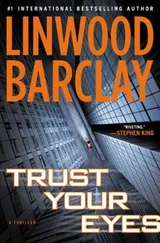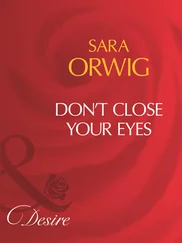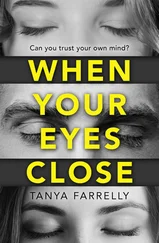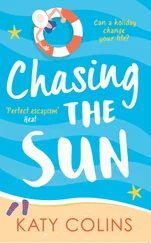“She must have her reasons,” I said.
“I’m sure she does,” said Lee.
YELLOW COUNTERPANES WITHblue flowers, a crosshatch weave on the heavy drapes, a low ceiling you could palm when standing, as Lee was, on one of the double beds, pink tile in the bathroom: our room for the night.
“You know who lives around here? Besides Charlie Flintwick?” She flopped down on the lumpy mattress and rolled over next to me.
“Who?”
“Rodgers Colston.”
Rodgers Colston. It was a name that should have made me stop and think Who? Oh! I haven’t thought of him in years. But no. Like Lee showing up out of the blue, but not really out of the blue — some people are with you all along, even when they’re not.
“Yeah?” I tried to modulate my voice, not to betray too much curiosity.
“He has a place up around here and an apartment in the city.”
I still thought of us, of my cohort, as being too young and not established enough to have more than one place of residence. I lagged behind the reality of my peer group.
“Let’s call him and see what he’s doing. I need a break from all this dad stuff.”
“You’re in touch with him?”
“I see him around now and then. I went to his last opening.”
She said it so casually but I couldn’t help hearing a cutting subtext: There is a whole world you are not a part of. When I first met Lee, I’m ashamed to say, I thought of her as “my famous friend,” that some social boundary had been made permeable and that I had been allowed to cross it. I wondered if I was merely an opportunist and Lee presented me with opportunities. Eventually that boundary disappeared and I hadn’t recognized it again until now, hearing her talk about Rodgers. But it wasn’t just that Lee was friendly with Rodgers. It was that they had been in touch when Lee and I weren’t. I had wanted to believe she had dropped out of the world for a while, when apparently, she had just dropped me.
Rodgers Colston belonged to that lazy, golden summer when Lee and Andy and I first became friends. That summer of long afternoons and warm dreamlike nights. Time worked differently. It blurred. There was a party once, a show, a thing, and I don’t know why but we decided to dress up. Lee fashioned herself an outfit involving a shiny bathing suit and a black slip she found at Savers. She stuck a few pieces of tinfoil in my hair and let me borrow a short purple shirt-dress that looked a bit like a uniform. Loose on her, the dress pulled at my chest and hips. I was still learning how to cultivate an appeal, figuring out what clothes to wear. Lee had introduced me to the subtle and transformative power of blush. That bright-eyed, Lizzy-Bennet-tramping-across-the-countryside glow. That I know my sister is prettier but with my radiant complexion am I not irresistibly spirited, Mr. Darcy? effect you could get, even though we barely needed it then. I took Lee’s word for it that I looked good. Andy wore a blue T-shirt with a large satin seahorse sewn on the front. We went to the old brick textile mill where Noah Stone and his friends lived, where silk-screening tables and a mountain of salvaged junk (bed springs, a washing machine, a carburetor, a pair of gigantic plush slippers in the shape of pigs) had been pushed to a wall to make room for a stage on which four guys in masks methodically generated discordant dance music. The smell of sweat and beer permeated the space.
Lee and I found ourselves in a room they called “the study,” where there were two torn-up sofas and shelves of mildewed books. I pulled down a pre-Fonda exercise manual featuring pictures of women in navy blue leotards demonstrating poses in a gauzily lit living room. I had opened to a page where a woman stretched her legs in a V, feet in the air.
“Maybe it’s because she reminds me of my mother, but that one does it for me.” The voice came from over my shoulder. Male, with a mildly Southern lilt to it. I became aware of my back, my spine, my bare collarbone as areas that could be touched by whoever that voice belonged to. I turned to see him. Sharp features, dark hair. Heeled boots that made him Abraham Lincoln tall. Slim-fitting brown corduroys secured by a leather belt with an ornate buckle. He also had on a black blazer and under that a pink T-shirt, which said Camp Young Judea across the front. I wondered if there wasn’t something vaguely anti-Semitic about him wearing this shirt, in the same way I’d puzzled, as a kid, over the bumper stickers that said “My Boss Is a Jewish Carpenter.” It was at these times that I most felt my Jewishness, if only because I became aware of it as something to be appropriated. I’d had a T-shirt just like that which I’d adorned with glitter paint one summer at a Jewish girls’ camp where we sang easy-listening hits and used shampoos that smelled like apricot. Another art school student somewhere probably had my old shirt in rotation.
But if his outfit confused me, it also made me less self-conscious in my blushing-alien-stewardess get up, which might have been sexy on Lee. Andy had envied Noah Stone for all the girls who wanted him, but I began to wonder what kind of way Noah had with women. These guys, these boys, made me feel like the young woman I was, but also like an aging and impotent dandy. Their bodies amazed and frustrated me. Then this walking pastiche came along and made an inappropriate joke about his mother.
“RODGERS COLSTON,” SAIDLee, as though they had a history. I half expected her to add, “So we meet again.”
“In the fleisch,” he said. To distract from whatever was passing between them, Lee introduced me.
“This is Miss X.” Was she trying to make me seem mysterious? Was there some reason I shouldn’t want Rodgers Colston to know my name?
“I like your tin foil, Miss X.”
“Thank you.”
“Miss X-Files.” He pronounced it X-falls, which sounded so much looser and better than the pinchy way I would say it: X-fiy-uls. I realized I was still holding the book of calisthenics. He seemed to be waiting for me to say something. Topics of conversation popped up in my mind like Whac-A-Moles: David Duchovny, squat thrusts, the Civil War. Everything got the mallet. I wondered if he could somehow read my thoughts because he just stood there, stooped over me, his mouth a little open and on the verge of a smile. Finally he said, “I’ll see y’round.”
I turned to Lee but she had gone. Out in the main room I spotted Andy on the sidelines of a throng by the stage. He raised his arms and gave me a “please save me” look, and I felt a huge surge of affection for him for being pudgy and wearing an ill-fitting shirt with a big satin seahorse on it. The performance ended and the sound system came on; the music grew progressively dronier as the crowd thinned. Still no sign of Lee. Andy and I found a disgusting mattress in a back room, and I was so tired all I wanted to do was lie down on it. It was disgusting in a way that I romanticized as arty.
I didn’t remember falling asleep, but a murmur woke me up. By then the place was silent. Lee knelt by Andy’s head, her mouth close to his ear. What she was saying I couldn’t make out, but something tender-seeming as her fingers brushed the side of his face. She kissed his temple, his forehead, and then she kissed him on the mouth. He sat up and pulled her closer, his hand in her hair. Through a triangle of space, my arm crossed over my face, I could watch without their knowing. Or so I thought. When Lee drew back for a moment, I shut my eyes but not before a flicker of contact had been made. She moaned a little, but the kissing continued until it was replaced by shifting and creaking. “Mmm,” I heard her say. “C’mon.” The springs in the mattress rose. Footsteps. I opened my eyes and they were gone.
Читать дальше
